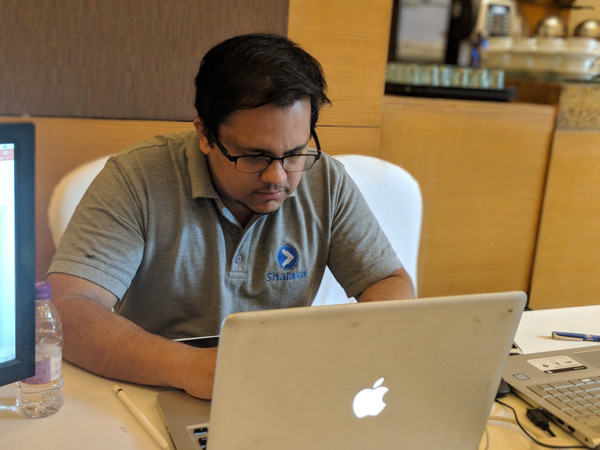
Hrishikesh is the CEO and managing partner of Shalaka Connected Devices LLP, a company focused on developing embedded and IoT solutions for various applications globally. It also provides various other services like PCB designing, assembly and testing along with prototype development, MVP development and productisation for large corporates as well as budding startup's.
With massive experience on IoT, his efforts currently revolves around making electronics industry prominent in India and and create an ecosystem for improving the electronics industry. Apart from that he is also an advisor at various startup’s in the electronics industry and helping the upcoming engineers to build a career in core engineering and innovation.
“My aim revolves around developing great quality electronics and IoT solutions that would empower our customers to leverage technology for betterment of their organisation.” Says Kamat when asked about his vision. We had few more questions to ask him and these were his answers
What inspired you to start Shalaka Connected devices? How did it initially get off the ground?
Shalaka connected devices was started with the hand holding of Shalaka Technologies Pvt Ltd originally started in 2002. It got off the ground in 2017 as an independent entity and is now building embedded and IoT solutions for various companies globally. Shalaka connected devices started with a team of 3 and now has touched 25 – completely bootstrapped with the funding of the founders, and is now growing organically
What problems does Shalaka intend to solve? What impact has it made on industries so far?
Shalaka intends to solve the problem of delayed product development especially with embedded systems and hardware development in India. Typically a product development cycle can take between 6 months to 1 year based on complexity. Shalaka has successfully reduced this time by 25% by using modular libraries and hardware.
Shalaka has helped industries ranging from home automation to manufacturing to automotive in developing products, research samples, or simple realising their ideas for various applications. For some clients we have been able to design solutions that have been patented by them and helped them grow business. We have also started providing assembly and testing services for our client that helped them get a single window solution for all their electronics need. For some companies we have been providing regular support for their electronics needs, thus branding shalaka as a single window solution for all electronic support.
What are your upcoming plans for the company?
Shalaka plans to focus on product development, manufacturing, assembly and training services for our clients. We plan to design at least 10 products a year with a lean team and quick approach. We are also focusing on developing mobile applications for their IoT solutions thus providing an end to end service.
Tell us about your team and your favourite project that was accomplished through Shalaka.
For a dairy industry we have been able to design a volume measuring system that is 10 times more accurate and cheaper than the competition thus enabling our client leverage it as a flagship product for their clients.
In another project shalaka has been able to achieve long distance and ultra low battery conserving equipment that can transmit data over a distance of 200-300 meters line of sight for an IoT application. We also built a Wi-Fi enabled IoT tracker that is shown below
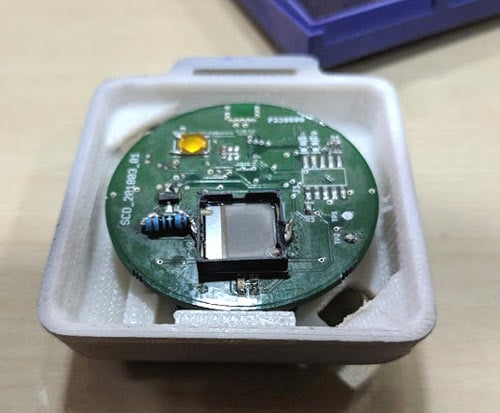
Currently, shalaka is also working on developing a IOT based home appliance which is in Indian market.
On your perspective, how has and will IoT change the ways on how businesses/industries operate today?
Today people are using IoT Technologies as a very key part of the organisation. IoT is being used by almost every SMEs in large Corporates either within the organisation or for their customers. In the year 2017 and 18 most companies have invested time and effort in building their first IoT use case. This quite shows how much IoT is going to affect various businesses.
Businesses today are running on data that is available from a larger perspective but are going to rely a lot on IoT for obtaining high resolution data. Everyone knows that data is the next Big buck and IoT is the primary steps towards achieving it. IoT is going to help businesses look deeper into their customers as well as their own operations and focus on improving their products as well as their manufacturing process.
What is your view on Industry 4.0? Is India’s ecosystem Ready for it?
Industry 4.0 is a very large concept and currently most of the companies are struggling with understanding the exact meaning of industry 4.0 and how it can be implemented in their company. India currently is in a very infant stage similar to most other developing and developed countries in the world.
Industry 4.0 is definitely the next industrial revolution because it is a perfect composition of Cyber physical space. Which machines interacting better with humans in providing Deep Inside as when is communicating with each other for increase efficiency the surely is going to revolutionize the entire manufacturing and service industry.
Most of the companies have interacted with recently, have a fair idea about industry 4.0. They have clear vision about the road map but lack the direction to take the first step. So it is the primary duty of any IoT service providing company to educate the market for better use of the technology they are providing. India currently lies on the lower size of the innovation curve but accelerating aggressively all leading this innovation sector. Industry 4.0 is going to have a very key role in this process.
Could you please de-mystify IoT, what is the best place/book to start with?
Everyone should understand that IoT is a combination of various existing Technologies like embedded systems, various types of wired and wireless communication, mobile applications in web applications cloud server Technologies. All these Technologies have been present since the last decade while some of them have been present since two or three decades.
More than focusing on reading a book on a white paper it is advised to build a solution a part of the solution the skills that are developed. Upcoming engineer should focus on developing one of these skills and becoming a master in it rather than trying to learn the entire IoT system. Best place to learn IoT skills is to work in a small company that design these solutions or use them does giving an inside view of the same
What is the biggest challenge while developing an IoT based hardware? Where are we lagging?
The biggest challenge in developing hardware especially for IoT systems is the analytical approach that is required to build an efficient hardware. The key for great hardware is focusing on the fundamentals and understanding the key to robustness. Reliability of hardware is one thing that engineers especially in the electronics sector have neglected. And this becomes the main hurdle for Hardware development.
Another challenge the hardware sector is that it is very time consuming. Software is typically easier to debug due to availability of great compilers and tools. But hardware requires basic knowledge about electronics and is very time consuming especially with the use of external testing equipments. Single mistake in the hardware development phase costs a time loss of 2 to 3 weeks. This experimental process is another reason why hardware industry is still not developing in India.
Another challenge in hardware development is the availability of components in short amount of time. Usually we have to order components from E-Commerce websites that take around 5 to 7 days for delivery and in case of additional component requirement costs another week off time delay due to unavailability at the local level. If majority of two components are available at a local level hardware development can be accelerated with easier testing facilities and lesser risk of time loss.
How can the budding engineers set themselves prepared for the upcoming IoT wave?
The upcoming engineers need to focus on one segment of the IoT architecture. They should understand the fundamental behind it and focus on building solutions that can be used in the real world. Understanding these Technologies at the most fundamental level is very important. For this upcoming engineer should focus on getting as much internship as possible.
I was excited to see that Shalaka also offers training on IoT, Bluetooth, ZigBee, MSP432, Embedded Systems etc. How can a student/individual or corporate take leverage of it?
Engineers at Shalaka has always been passionate about teaching because that is the way better human resources groomed for everyone in the ecosystem. Also we believe that teaching is a process of strengthening you are engineering skills. This is the very reason why Shalaka has a training wing.
Shalaka provides training to corporate on technology or product levels. Just help companies focus on the business and worry less about their Technology wing.
The retail training segment intended towards real life product development rather than lab experiment. This training session focuses on developing parts of an IoT solution in understanding the development life cycle via hands on learning. Unlike typical training organisations Shalaka focuses on a flexible syllabus on latest technology. Shalaka believes that the art of learning is more important in the long run. Today most upcoming engineers join training courses with rigid syllabus that is upgraded very rarely. Eventually useful skills become obsolete. If people are able to embrace the art of learning one is able to stay on the technological curve and grasp upcoming Technologies with minimum effort. This is the key focus for the training wing at Shalaka.
It’s amazing that you had your first start-up at the age of 14, what do you think is the right age for someone to own a start-up?
Knowingly or unknowingly I have always been with an entrepreneur based mind set. I do not know about startup but the right time to do something on your own is now. At every age in life we are faced with some challenges that are common to many build a solution to it. The scenario can be anywhere around you. Set an open mind and a solution oriented perspective one is able to build an activity based organisation that might be run by an individual but solve the problem for many. This is somewhere lost today. In free time I always suggest everyone to look around for problems and sort them even if they do not provide any monetary benefits.
Start-up does not necessary mean of big organisation but it can be an individual who is working to solve the problem and be successful in doing so. Startup is just a term that is defined for the millennial generation but the core essence has been present since centuries. Even school kid can develop an entrepreneur mindset by focusing on problems and finding the selection in the most efficient way
How was your experience as a Cadet at NASA Space Academy? Any particular incident to share?
NASA space Academy was one of the most interesting parts of my life because it helped me realise my true potential and my drawbacks. The entire training focused on activities that real life astronauts and pilots undergo in their training phase. It was a mixture of physical and mental activities that made you scratch your brain and stretch your body to its possible limits. My most favourite memory is the mark space shuttle simulation that helped us experience the entire Space Shuttle machine process. The NASA space Academy experience has played an important role in the overall aptitude towards problem solving that I’ve developed.
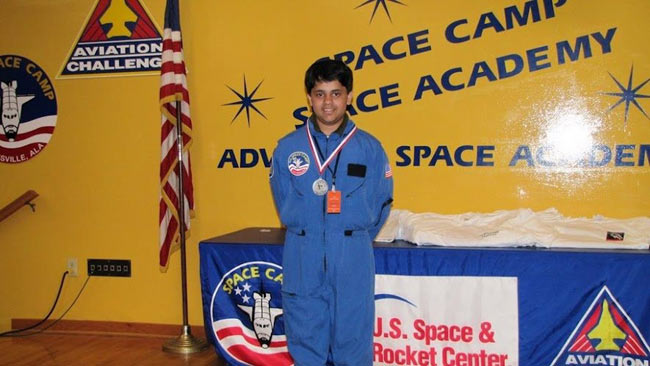
With over 7 years of experience on embedded domain, what is your favourite piece of hardware and software to work with?
Every project has been an experience on its own and it is really hard to separate one as a favourite. Every project has been a learning lesson for the next in time and again we have discovered New problems and challenges.
How does your work environment look like?
Our work environment is typically very messy but organised since we deal with a lot of hardware, soldering, small components and lot of testing equipment's. Our typical work desks are filled with electronics and samples of products we are working on. My personal work desk is more organised since most of my work is limited to my laptop and my programming/hardware tasks are done with the team on their work benches.
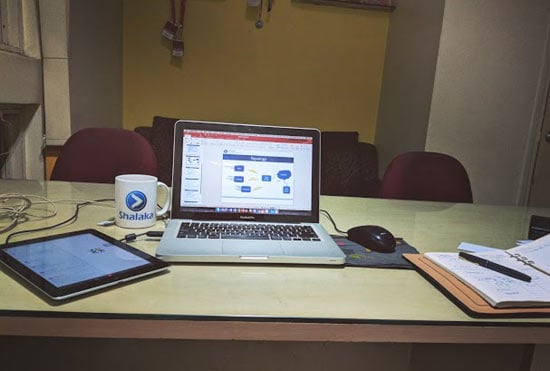
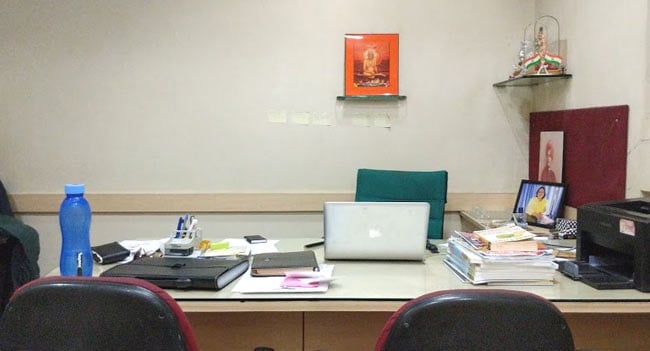
our small prototype room used only for quick prototyping or experimenting
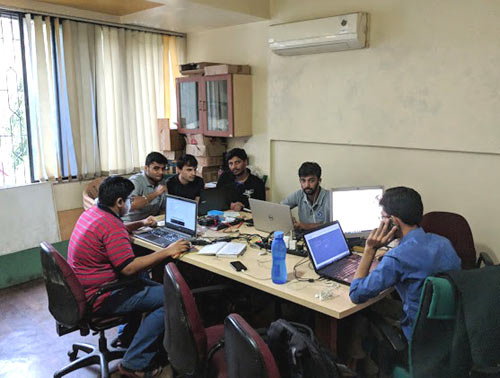
What are the pros and cons of running a Product Development company like Shalaka in India?
India is gaining great momentum in the field of electronics and a lot of companies are looking to get their solutions/products designed and manufactured in India which is the biggest plus. Since the last 3 years the number of enquiries and opportunities we receive in this segment is growing steadily. The hard part is that most of the market is uneducated in terms of challenges and timelines regarding product development in the hardware sector. Being a sector that physically involves a lot of hardware design, the process is slow and time consuming – and unlike software industry the results are not quick. Also, there is an underdeveloped electronics ecosystem that needs to be developed in order to have quicker support on the various aspects of embedded product development like easier access to components, quicker support from companies for queries and more hardware labs for testing.
What would be your word of advice to upcoming aspiring technopreneur?
My only advice to upcoming aspiring technopreneur, is that they should focus on solving problems starting at their local levels. Most aspiring entrepreneurs I have met in the past 3 years are more focused on following a business model that they have observed in an ecosystem/market unlike ours. Also, I usually advices them not to jump in the bandwagon just because they see that there is lot of investment being done, because having sufficient technical knowledge about something is as important as running and growing the company.

